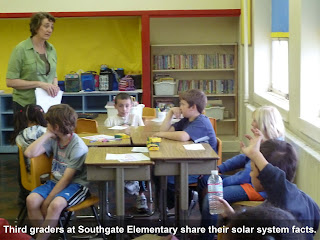 By Nancy Uziemblo, Geologist, Nuclear Waste Program
By Nancy Uziemblo, Geologist, Nuclear Waste ProgramWe talk about Hanford cleanup and actively promote care of the Earth… Why not extend it to the solar system? When asked to share a geology lesson, sometimes I get carried away and think big. So when Sangetta Goswami (wife of Dib Goswami, Hydrogeologist with the Nuclear Waste Program) requested my annual geology lesson for the 3rd graders at Southgate Elementary School, I said, "Sure!" This time we would study our solar system, how big it is, and how we fit in.
In the classroom, I showed recent pictures of the sun, planets and moons from the NASA website. The students were each assigned a planetary body and came ready to share a fact that they gathered about it. This research prepared them to go to the playground and act like the sun, planets, dwarf planet, planets’ rings and many moons in our solar system. If one student was Europa, she would be rotating around Jupiter. A few students twirled about Saturn as one of its many rings. Uranus would be poised tilted, and Mercury would be small and hot when he was facing the sun.
Outside we stretched a 100-foot rope marked with the relative locations of the sun, planets and Pluto and became the solar system! The students ran to their spots and acted large or small, hot or cold. The inner planets and their moons realized how crammed they were being so close to the sun. Pluto and its moons were a bit lonely at the end of the rope and waved to their nearest neighbor, Neptune. Uranus realized it was hard to lean sideways.
We learned how big our solar system is and that there are large planets, hot planets, tiny planets and far away planets. The students know that we are not alone in our solar system, and I think they will now extend that care to our planetary objects near and far.
For more information about Ecology in the classroom or to schedule a presentation, please contact Erika Holmes, 509-372-7880. Keep tabs on Hanford with our Hanford Education & Outreach Facebook page and email list.



No comments:
Post a Comment